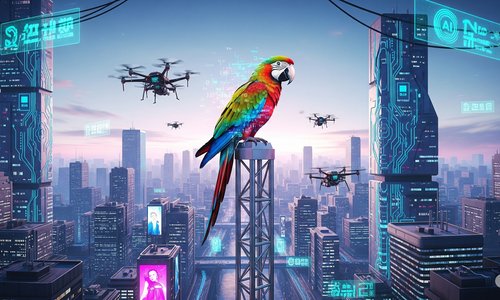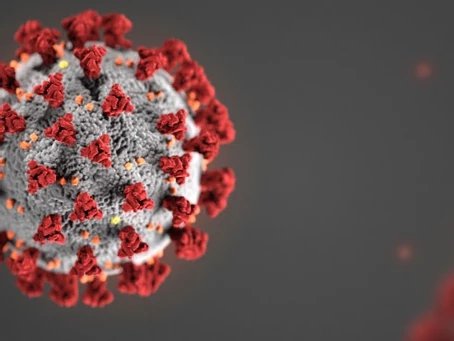
A Promessa e o Perigo da Nova Revolução Digital
A nova corrida tecnológica global levanta uma pergunta urgente: estamos prontos para confiar na inteligência que criamos?

O mundo está em crise devido à pandemia do Coronavírus que tem se espalhado por vários países numa velocidade alarmante. Os efeitos econômicos da disseminação do vírus, tanto nas empresas que são impactadas diretamente, bem como o efeito em cascata deste impacto trás enormes desafios para governos, organizações e líderes.
Não quero propagar o pânico ao tocar neste assunto, muito pelo contrário, quero trazer insights relevantes aos gestores de negócios, e vou fazer isso da maneira que posso contribuir melhor: apresentando como a Inteligência Artificial tem ajudado ou pode ajudar em tempos de crise.
Os usos de Inteligência Artificial que fizeram diferença desde o início da epidemia do Corona Vírus
A Inteligência Artificial já tem sido usada no acompanhamento da epidemia de forma muito efetiva. Um algoritmo desenvolvido pela gigante chinesa de tecnologia, Alibaba, consegue diagnosticar com 96% de acurácia se um paciente está infectado com corona vírus em questão de segundos, 20 para ser mais preciso, usando imagens de tomografias computadorizadas, muito mais rápidos que o tempo de métodos convencionais que levam em média 15 minutos. A empresa deve usar algoritmos de visão computacional e Deep Learning para encontrar padrões apreendidos em casos já laudados e usar este conhecimento para identificar novos casos.
A empresa canadense Bluedot tem usado inteligência artificial de outra forma através do monitoramento de notícias em língua estrangeira, redes de doenças de animais e plantas e proclamações oficiais para avisar seus clientes com antecedência para evitar zonas de perigo como Wuhan. A empresa conseguiu alertar seus clientes ainda em 31 de dezembro de 2019, antes que a informação se espalhasse. O algoritmo também acessa dados globais de emissão de passagens aéreas que podem ajudar a prever onde e quando estarão os novos infectados. O algoritmo da Bluedot previu corretamente que o vírus saltaria de Wuhan para Bangkok, Seul, Taipei e Tóquio nos dias seguintes à sua aparição inicial. A Bluedot fez o bom uso de algoritmos de Aprendizagem de Máquina para identificar padrões e simulações para avaliar cidades mais prováveis de contágio.

Bluedot explorer com dados em tempo real e algoritmos de predição
A startup italiana Paginemediche criou um chatbot para interagir e avaliar se as pessoas estão com sintomas compatíveis com o Coronavírus, dando escalabilidade ao atendimento de pessoas e trazendo informação de forma veloz e eficiente.

Exemplo do uso do chatbot da Paginemediche
E o famoso caso da empresa de biogenética Sul Coreana, a Seegene, que conseguiu se antecipar e utilizar seu algoritmo de Inteligência Artificial para criar em semanas (trabalho que demoraria meses), um kit de teste para identificar à contaminação do vírus. Isso permitiu que a Coreia do Sul controlasse e diminuísse o contágio muito mais rápido que outros países que passaram pelo mesmo momento.
No Brasil a Tribots (tribots.com.br) movimento que atua no desenvolvimento de soluções conversacionais, criou um chatbot para ajudar no esclarecimento dúvidas sobre o Coronavirus muito bacana, em um formato simples, objetivo que está ajudando a população na prevenção. Veja em: http://bit.ly/SobreCoronavirus
Esses são apenas alguns exemplos de como a IA tem sido usada de maneira a combater diretamente a epidemia e a sua propagação.
Como IA pode ajudar em tempos de crise
Agora, para a maioria das empresas, além do eventual impacto na saúde de seus funcionários, o grande impacto a preocupante é o econômico. E nesse sentido também há inúmeras oportunidades de se utilizar Inteligência Artificial.
A Inteligência Artificial permite a redução de custos, otimização de recursos e flexibilidade organizacional. A construção de ativos digitais permite acesso ao mercado global e o foco em regiões que estão se recuperando da crise, além de permitir mais facilmente os caminhos alternativos e digitais para tarefas importantes.
Uma das tecnologias ligadas à Inteligência Artificial, o RPA, Robotic Process Automation, ou Automação robotizada de processos, permite a automatização de tarefas repetitivas com alto grau de eficiência. O envio automático de e-mails numa campanha de vendas, a análise de informações e a construção de relatórios automáticos, a atualização de informações em sistemas, leitura e conferência de documentos, só para citar algumas aplicações podem trazer velocidade e redução de custos num momento em que cada centavo importa.
A construção de ativos digitais como algoritmos de logística, vendas, operações, marketing entre outros, e fazer uso de um modelo de negócios bastante atual, Software as a Service, ou o SaaS, que vende a utilização destes algoritmos como serviços no formato de APIs ou soluções customizáveis cria uma maior flexibilidade de atuação e uma maior capacidade de internacionalização.
Por exemplo, se quero manter minhas atividades de vendas mesmo com a restrição da circulação de pessoas que podem ocorrer com intensidades variadas em regiões diferentes, eu posso migrar meus canais com ênfase no atendimento digital, através de Chatbots ou através de automatização utilizando RPA de todo meu funil de vendas.
Se preciso reduzir custos com retrabalho e desperdícios, posso criar algoritmos de aprendizagem de máquina para identificar padrões de falhas e atuar de maneira assertiva na manutenção de atividades de manufatura, por exemplo.
Nós, da I2AI, temos ajudado muitas empresas na utilização de Inteligência Artificial com foco na otimização e redução de custos e eliminação de desperdícios com resultado bastante impactantes.
O segredo de escolher bons projetos está em identificar oportunidades de menor complexidade onde a Inteligência Artificial pode trazer retornos rápidos em relação aos investimentos necessários. E na nossa experiência há muito espaço, especialmente na aplicação de RPA, onde os benefícios estão visíveis e as velocidades e custos de implementação são bastante adequados para o momento que estamos vivendo.
Se você ainda não parou pra pensar em como redesenhar sua estratégia para melhor enfrentar a crise, a hora é agora, e tenho certeza que os ativos digitais, especialmente de Inteligência Artificial podem lhe ajudar e muito nesta missão.

Estudo da EY sobre as gerações de robôs de RPA e seus impactos nos negócios
Conselheiro fundador da I2AI – Associação Internacional de Inteligência Artificial. Também é sócio-fundador da Engrama, sócio da Startup Egronn, e na consultoria Advance e investidor na startup Agrointeli . Tem mais de 20 anos de experiência em multinacionais como Siemens, Eaton e Voith, com vivência em países e culturas tão diversas como Estados Unidos, Alemanha e China.
Palestrante internacional, professor, pesquisador, autor, empreendedor serial, e amante de tecnologia. É apaixonado pelo os temas de Estratégia, Inteligência Competitiva e Inovação.
É Doutor em Gestão da Inovação e Mestre em Redes Bayesianas (abordagem de IA) pela FEA-USP. É pós-graduado em Administração pela FGV e graduado em Engenharia Mecânica pela Unicamp.

A nova corrida tecnológica global levanta uma pergunta urgente: estamos prontos para confiar na inteligência que criamos?

Por que dominar a IA será a nova alfabetização do século XXI

Conselhos de Administração devem evoluir da supervisão reativa para a antecipação estratégica, frente à crescente complexidade e volatilidade dos ambientes de negócios.

De 14 a 25 de julho, reserve suas manhãs das 08h00 às 09h30 para participar da tradicional Maratona I2AI! Uma jornada intensa com debates e palestras sobre temas essenciais: Ética,